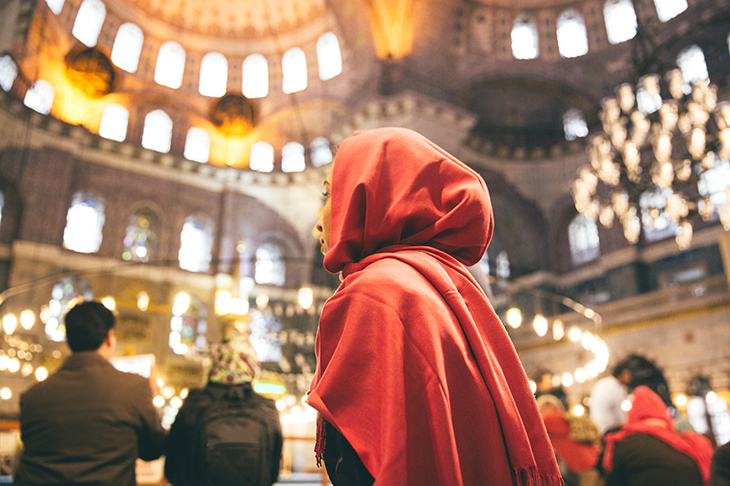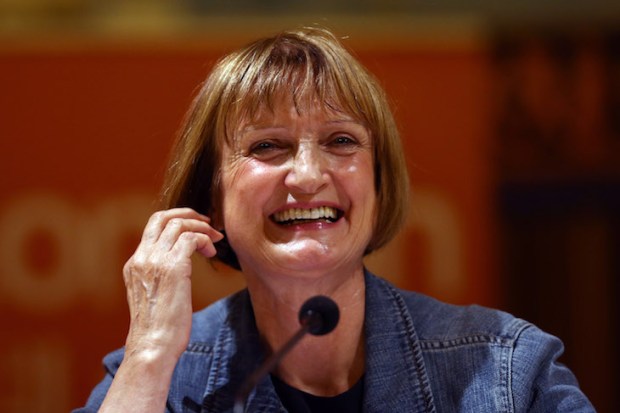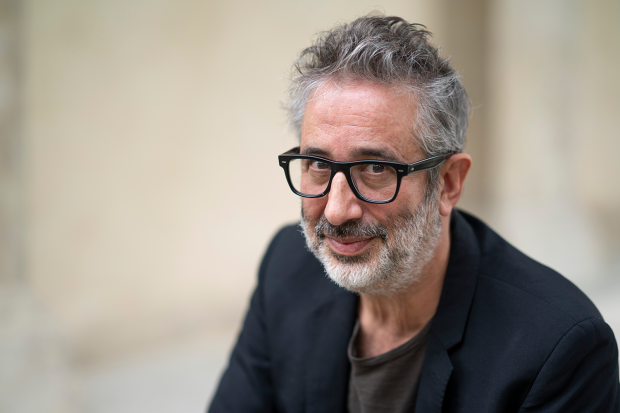On returning from a brief trip to Istanbul, where inside the mosques women are still very much kept to one side, only allowed to look on from an angle, unable to contemplate the full mystery of the space created within those extraordinary domes, I was intrigued on Sunday to happen upon Heart and Soul (produced by Lindsay Leonard) and to hear a Muslim woman leading the prayers to Allah. She sounded so natural, so intent, her voice modulated and firm, uplifting and authoritative. But how, I wondered, is this possible? Where is this female imam allowed to practise?
It turned out that Samira Ahmed (from Radio 4’s Front Row) was reporting for the World Service from the Inclusive Mosque Initiative in north London, where men and women pray side by side and all the leadership positions have been given to women. In this mosque it is the men who lay out the prayer mats and make the tea. ‘We’re not trying to change the attitudes of Muslims who are more conservative,’ Ahmed was told. ‘We just want to practise our faith in the way that works for us.’
It’s not just about justice for women. Conversations inside the mosque attempt to reconcile being Muslim and homosexual, Shia and Sunni, and the questioning of faith, not blind acceptance, is encouraged. Ahmed also travelled north to Bradford, where one quarter of the population is now Muslim and more than 110 mosques have been created since the first Muslim immigrants from south Asia arrived there more than half a century ago. Here, too, changes are afoot as their grandchildren and great-grandchildren question the way women have been sidelined from religious practice.
She talked to Bana Gora, chief executive of the Muslim Women’s Council, which is seeking to build an all-inclusive mosque, governed by women. But prayers at this as-yet-unbuilt mosque, although attended by both men and women, will be led by a male imam. ‘Why?’ asked Ahmed. Gora’s determination to create an equal space for men and women is leavened by realism. ‘Asking men to prostrate themselves behind a woman will create controversy,’ she said in a programme that took us beyond the superficial.
Now here’s a question to tax the experts who decipher those impenetrable questions on Round Britain Quiz. What connects Olivier Messiaen, Johnny Rotten, Peter Pears and Johnny Cash? They’ve all performed in prison, as we discovered from Carl Cattermole’s programme for Radio 4, Concerts Inside (produced by Rosie Boulter). I missed it last week but if you’re quick you can catch it on BBC Sounds. Cattermole talks to fellow ex-inmate Erwin James, who was in Long Lartin prison when the great but underrated singer-songwriter John Martyn arrived to give a concert. The jail was overcrowded, claustrophobic and like ‘paranoia city’, said James, a really dangerous place full of characters called Fat Cat and Crusher. But as soon as Martyn stepped out to sing, a shy man with an acoustic guitar, his audience were silenced, making connections through the lines: ‘And may you never lay your head down/ Without a hand to hold/ May you never make your bed out in the cold.’
How many of them had been alone or homeless?
As Cattermole says, it was like a message from the outside world, in a programme that gave us such a variety of experience from Messiaen composing and performing his Quartet for the End of Time while a PoW in Germany in 1941 to the Sex Pistols’ concert in Chelmsford maximum-security prison in the 1970s. He argues persuasively that listening to music while inside ‘can bring you back to the person you really are’.
Pears performed with Benjamin Britten in Wormwood Scrubs in July 1943, alongside one of the prisoners, the composer Michael Tippett, who was in jail as a conscientious objector. What was on the programme is not known but Cattermole suspects there will have been traditional folk songs about lonely, dysfunctional figures living on the edge. ‘It’s really an important gesture,’ he says. The truest form of solidarity. He regrets that he never experienced such a concert because they no longer take place.
Jeremy Raison’s five-part drama series, Cuckoo, for Radio 4 (directed by David Ian Neville), is based on the memoir written by his mother that he discovered after her death, along with a series of photographs and a set of divorce papers. They tell of her strange childhood, abandoned by her mother and brought up by her nanny who eventually became her stepmother. But the details are missing and Raison is left with so many questions. Why was his mother, unlike her siblings, not allowed to go to school? Who was Miss Land? In Cuckoo he seeks to fill in the gaps, providing coherence to a story that to him doesn’t make sense.
At first this seemed like many other Radio 4 family sagas but the clarity of the writing, the clever way Raison interweaves his mother and grandmother’s story with his own quest to find out what happened, plus the pure, clean lines of the production, drew me in so that I listened to all five episodes in one session. It’s sharply played, too, by Susan Jameson, Ewan Bailey and Melody Grove.
Got something to add? Join the discussion and comment below.
Get 10 issues for just $10
Subscribe to The Spectator Australia today for the next 10 magazine issues, plus full online access, for just $10.
You might disagree with half of it, but you’ll enjoy reading all of it. Try your first month for free, then just $2 a week for the remainder of your first year.














Comments
Don't miss out
Join the conversation with other Spectator Australia readers. Subscribe to leave a comment.
SUBSCRIBEAlready a subscriber? Log in